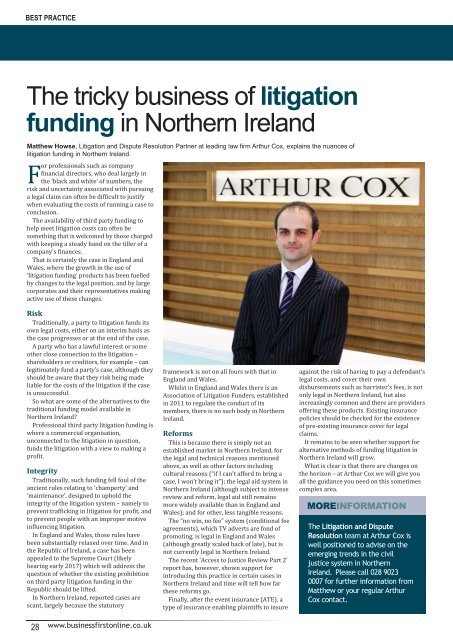November Business First
November issue of Business First, Northern Ireland's Business Magazine
November issue of Business First, Northern Ireland's Business Magazine
Create successful ePaper yourself
Turn your PDF publications into a flip-book with our unique Google optimized e-Paper software.
BEST PRACTICE<br />
The tricky business of litigation<br />
funding in Northern Ireland<br />
Matthew Howse, Litigation and Dispute Resolution Partner at leading law firm Arthur Cox, explains the nuances of<br />
litigation funding in Northern Ireland.<br />
or professionals such as company<br />
financial directors, who deal largely in<br />
Fthe ‘black and white’ of numbers, the<br />
risk and uncertainty associated with pursuing<br />
a legal claim can often be difficult to justify<br />
when evaluating the costs of running a case to<br />
conclusion.<br />
The availability of third party funding to<br />
help meet litigation costs can often be<br />
something that is welcomed by those charged<br />
with keeping a steady hand on the tiller of a<br />
company’s finances.<br />
That is certainly the case in England and<br />
Wales, where the growth in the use of<br />
‘litigation funding’ products has been fuelled<br />
by changes to the legal position, and by large<br />
corporates and their representatives making<br />
active use of these changes.<br />
Risk<br />
Traditionally, a party to litigation funds its<br />
own legal costs, either on an interim basis as<br />
the case progresses or at the end of the case.<br />
A party who has a lawful interest or some<br />
other close connection to the litigation –<br />
shareholders or creditors, for example – can<br />
legitimately fund a party’s case, although they<br />
should be aware that they risk being made<br />
liable for the costs of the litigation if the case<br />
is unsuccessful.<br />
So what are some of the alternatives to the<br />
traditional funding model available in<br />
Northern Ireland?<br />
Professional third party litigation funding is<br />
where a commercial organisation,<br />
unconnected to the litigation in question,<br />
funds the litigation with a view to making a<br />
profit.<br />
Integrity<br />
Traditionally, such funding fell foul of the<br />
ancient rules relating to ‘champerty’ and<br />
‘maintenance’, designed to uphold the<br />
integrity of the litigation system – namely to<br />
prevent trafficking in litigation for profit, and<br />
to prevent people with an improper motive<br />
influencing litigation.<br />
In England and Wales, those rules have<br />
been substantially relaxed over time. And in<br />
the Republic of Ireland, a case has been<br />
appealed to the Supreme Court (likely<br />
hearing early 2017) which will address the<br />
question of whether the existing prohibition<br />
on third party litigation funding in the<br />
Republic should be lifted.<br />
In Northern Ireland, reported cases are<br />
scant, largely because the statutory<br />
28 www.businessfirstonline.co.uk<br />
framework is not on all fours with that in<br />
England and Wales.<br />
Whilst in England and Wales there is an<br />
Association of Litigation Funders, established<br />
in 2011 to regulate the conduct of its<br />
members, there is no such body in Northern<br />
Ireland.<br />
Reforms<br />
This is because there is simply not an<br />
established market in Northern Ireland, for<br />
the legal and technical reasons mentioned<br />
above, as well as other factors including<br />
cultural reasons (“if I can’t afford to bring a<br />
case, I won’t bring it”); the legal aid system in<br />
Northern Ireland (although subject to intense<br />
review and reform, legal aid still remains<br />
more widely available than in England and<br />
Wales); and for other, less tangible reasons.<br />
The “no win, no fee” system (conditional fee<br />
agreements), which TV adverts are fond of<br />
promoting, is legal in England and Wales<br />
(although greatly scaled back of late), but is<br />
not currently legal in Northern Ireland.<br />
The recent ‘Access to Justice Review Part 2’<br />
report has, however, shown support for<br />
introducing this practice in certain cases in<br />
Northern Ireland and time will tell how far<br />
these reforms go.<br />
Finally, after the event insurance (ATE), a<br />
type of insurance enabling plaintiffs to insure<br />
against the risk of having to pay a defendant’s<br />
legal costs, and cover their own<br />
disbursements such as barrister’s fees, is not<br />
only legal in Northern Ireland, but also<br />
increasingly common and there are providers<br />
offering these products. Existing insurance<br />
policies should be checked for the existence<br />
of preexisting insurance cover for legal<br />
claims.<br />
It remains to be seen whether support for<br />
alternative methods of funding litigation in<br />
Northern Ireland will grow.<br />
What is clear is that there are changes on<br />
the horizon – at Arthur Cox we will give you<br />
all the guidance you need on this sometimes<br />
complex area.<br />
MOREINFORMATION<br />
The Litigation and Dispute<br />
Resolution team at Arthur Cox is<br />
well positioned to advise on the<br />
emerging trends in the civil<br />
justice system in Northern<br />
Ireland. Please call 028 9023<br />
0007 for further information from<br />
Matthew or your regular Arthur<br />
Cox contact.


